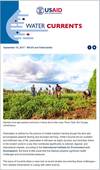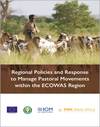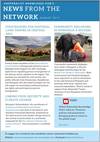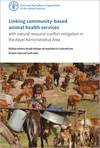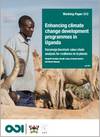Pastoralism is defined by the practice of mobile livestock herding though the term often encompasses pastoral farming and enclosed ranching. While it sounds like an outdated and inefficient way of life, pastoralism is highly dynamic and intricately linked to the modern world in a way that contributes significantly to national, regional, and international markets. But there is little doubt that this lifestyle presents significant health challenges and environmental pressures.
This issue of Currents takes a close look at recent studies documenting these challenges—from disease transmission to coping with water scarcity.
Organization: الوكالة الأمريكية للتنمية الدولية
Topic: تغير المناخ, أمن غذائي, بين الجنسين والشباب, الرعاية الصحية, خدمات اجتماعية
Language: English
Type of document: تقني
Geographical coverage: مناطق العالم
Under the jointly funded European Union and ECOWAS “Support to Free Movement of Persons and Migration in West Africa” (FMM West Africa) project, this study was conducted to assess how far and to what effect movement policies, legislation and practices are being applied to transhumant pastoralism and develop recommendations on how ECOWAS Member States – particularly in Mali, the Niger and Nigeria – can improve legislation and policy regarding transhumant pastoralism. This study is set to inform ECOWAS and its member states’ thinking on developing a regulatory framework for transhumant pastoralism in the ECOWAS region that is consistent with the ECOWAS Free Movement of Persons principle and responsive to the substantive changes in this sector.
Year of publication: 2017Organization: الاتحاد الأوروبي, كتاب مستقلون
Topic: منظمة
Language: English
Type of document: تقني
Geographical coverage: غربية افريقيا
Newsletter containing updates of activities, events and experiences from among pastoral civil society organizations.
Year of publication: 2017Organization: منظمة الأغذية والزراعة للأمم المتحدة
Topic: تغير المناخ, بين الجنسين والشباب, الإدراك الفطري, الشعوب الأصلية, نوع الملكية, منظمة, مشاركة
Language: English
Type of document: النشرات الإخبارية
Geographical coverage: مناطق العالم
Several interlinked triggers such as climate change, environmental degradation, lack of resources, and so on, cause large-scale displacement of populations in the Horn of Africa. This may, in turn, trigger conflicts and violence and increase the communities' vulnerability to natural hazards. There is a great need to address the risk and impacts of displacement caused by disasters and exacerbated by climate change. But to be able to do this, governments need baseline data regarding current displacement.
This report provides such a baseline for the Greater Horn of Africa - Djibouti, Eritrea, Ethiopia, Kenya, Somalia, South Sudan, Sudan and Uganda, plus Burundi, Rwanda and Tanzania - with the ultimate aim of reducing future displacement risk. These countries also have a large pastoralist population. The report gives an overview of the scale, scope and distribution of risk associated with suddenonset natural hazards, and explains the methodology used to calculate it.
Organization:
Topic: تغير المناخ, صراع, أمن غذائي, نوع الملكية, مرونة
Language: English
Type of document: تقني
Geographical coverage: شرق أفريقيا
Newsletter containing updates of activities, events and experiences from among pastoral civil society organizations.
Year of publication: 2017Organization: منظمة الأغذية والزراعة للأمم المتحدة
Topic: تغير المناخ, بين الجنسين والشباب, الإدراك الفطري, الشعوب الأصلية, ابتكار, نوع الملكية, منظمة, مشاركة
Language: English
Type of document: النشرات الإخبارية
Geographical coverage: مناطق العالم
The Abyei Administrative Area is a contested zone located on the border between South Sudan and Sudan whose status remains unresolved since the separation of the countries. It is a grazing hub in which both the Dinka Ngok (affiliated with South Sudan) and the Missiriya (affiliated with Sudan) tribal communities interact, sharing natural resources such as grazing land, pastureland and water. However over the past decades, access to natural resources has become increasingly contested, causing ethnic tensions and undermining livelihoods and cooperation between the groups. This report highlights the role that FAO has played in initiating and facilitating a process focused on dialogue and building social cohesion at grassroots level, contributing to wider sustainable peace initiatives. It has done this through the technical delivery of community-based animal health veterinary services in an effort to improve inter–community relations to sustaining peace.
Year of publication: 2017Organization: منظمة الأغذية والزراعة للأمم المتحدة
Topic: صراع, مرونة
Language: English
Type of document: تقني
Geographical coverage: شرق أفريقيا
Progressive control pathways (PCPs) are stepwise approaches for the reduction, elimination, and eradication of human and animal diseases. This article outlines a PCP for tsetse - transmitted animal trypanosomiasis, the scourge of poor livestock keepers in tropical Africa.
Initial PCP stages focus on the establishment of national coordination structures, engagement of stakeholders, development of technical capacities, data collection and management, and pilot field interventions. The intermediate stage aims at a sustainable and economically profitable reduction of disease burden, while higher stages target elimination. The mixed - record of success and failure in past efforts against African animal trypanosomiasis (AAT) makes the development of this PCP a high priority.
Year of publication: 2017
Organization: منظمة الأغذية والزراعة للأمم المتحدة, كتاب مستقلون
Topic: الرعاية الصحية
Language: English
Type of document: تقني
Geographical coverage: مناطق العالم
Climate change will have significant impacts on economic activity and value chains in Uganda. But it can also provide new possibilities for people and businesses – for example, to create new products and services, develop new markets and access new funding streams and finance mechanisms.
The semi-arid Karamoja region in the northeast of Uganda accounts for around 20% of Uganda’s total livestock. This paper identifies and explores the economic opportunities for entrepreneurs and companies to invest in climate change adaptation to enhance the resilience of Karamoja’s livestock value chain. Investment in this sector can reduce the vulnerability of pastoralists to climate change and contribute to national development goals.
Year of publication: 2017Organization: معهد التنمية الخارجية
Topic: تغير المناخ, اقتصاد, ابتكار, منظمة, مرونة, القيمة المضافة
Language: English
Type of document: تقني
Geographical coverage: شرق أفريقيا


